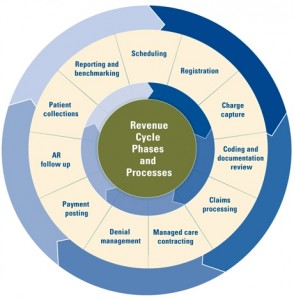In the intricate landscape of healthcare finance, revenue cycle management (RCM) stands as the linchpin that determines the financial vitality of healthcare organizations and payers alike. This comprehensive process, spanning from patient registration to claim submission and payment collection, plays a pivotal role in ensuring smooth financial operations within the healthcare sector. In this blog post, we will delve into proven strategies tailored specifically for healthcare organizations and payers to streamline and accelerate their revenue cycle management, ultimately boosting cash flow and ensuring financial resilience.

The Crucial Role of Revenue Cycle Management in Healthcare
Efficient RCM is paramount for healthcare organizations and payers, where the intricacies of medical billing, claims processing, and reimbursement demand specialized attention. The revenue cycle encompasses patient registration, insurance verification, charge capture, claims submission, payment posting, denial management, and patient billing – each stage vital for financial success in the healthcare industry.
The Necessity of Streamlining: How RCM Impacts Cash Flow in Healthcare
In the context of healthcare finance, streamlined RCM is directly tied to cash flow. Accelerating the revenue cycle reduces the time between delivering medical services and receiving reimbursement. Timely payments are critical for healthcare organizations and payers to meet operational expenses, invest in quality care initiatives, and adapt to evolving industry demands promptly.
Proven Strategies for Accelerating Revenue Cycle Management in Healthcare
- Specialized Healthcare RCM Software: Implementing RCM software tailored for healthcare streamlines billing processes, ensuring accuracy in coding and compliance with healthcare regulations. These specialized tools automate workflows, reducing administrative burdens and expediting revenue collection.
- Insurance Eligibility Verification Systems: Deploy advanced eligibility verification systems to confirm patients’ insurance coverage before providing services. This proactive approach minimizes claim denials due to eligibility issues and accelerates the claims submission process.
- Integrated Electronic Health Records (EHR) Systems: Seamless integration of EHR systems with RCM processes enhances data accuracy and accessibility. This integration facilitates smoother transitions between patient care and billing, reducing errors and expediting claims processing.
- Staff Training on Healthcare Billing Compliance: Healthcare billing is intricate and subject to constant regulatory changes. Regular staff training on billing compliance ensures that healthcare organizations and payers adhere to the latest industry standards, reducing errors and mitigating compliance risks.
- Utilization of Predictive Analytics for Claims Processing: Leverage predictive analytics to identify patterns and potential issues in claims processing. By proactively addressing potential bottlenecks, healthcare organizations can prevent claim denials and accelerate the revenue cycle.
Technological Advancements in Healthcare RCM
Technology also plays a pivotal role in optimizing revenue cycle management. Artificial intelligence, machine learning, and blockchain applications are reshaping how healthcare organizations and payers manage their financial processes. From automated claims adjudication to fraud detection, embracing these technological advancements enhances efficiency and accuracy in revenue cycle management.
The Future of Healthcare RCM: Embracing Innovation
As healthcare continues to advance, the future of revenue cycle management holds promises of increased efficiency and accuracy. Innovations such as blockchain for secure data sharing, AI-driven predictive modeling for reimbursement forecasting, and interoperability solutions for seamless information exchange are poised to revolutionize RCM in healthcare. Embracing these innovations strategically positions healthcare organizations and payers for sustained financial success.
Navigate the Ever-Evolving Landscape of Healthcare Revenue Cycle Management With BHM Healthcare Solutions
Revenue cycle management is a linchpin for financial success in healthcare organizations and payers. By implementing specialized strategies such as utilizing healthcare RCM software, insurance eligibility verification systems, integrated EHR systems, staff training on billing compliance, and predictive analytics, these entities can accelerate their revenue cycle and boost cash flow.
| Editor’s Note: BHM Healthcare Solutions offers case review and medical director expertise, business intelligence, software, CIA consulting services and accreditation support focused on improving patient care. Contact BHM for a brief discussion on how BHM achieves success. CLICK HERE |





